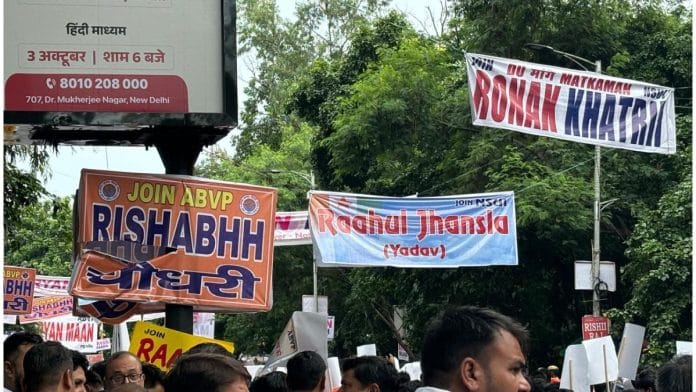New Delhi: The National Students’ Union of India (NSUI) has marked a significant victory in the Delhi University Students’ Union (DUSU) election this year, reclaiming the presidential post after a seven-year gap.
The DUSU election results came out Monday after a two-month-long wait.
As the NSUI marked victories in the key posts of president and joint secretary, the Akhil Bharatiya Vidyarthi Parishad (ABVP) retained its influence by clinching the vice president and secretary posts. The results reflected a split mandate.
NSUI’s Ronak Khatri and Lokesh Choudhary are the new president and joint secretary, respectively. On the other hand, ABVP’s Bhanu Pratap and Mitravinda Karanwal are the new vice president and secretary, respectively.
Despite the excitement surrounding the elections, the results echo a familiar story. Once again, the NSUI and ABVP dominate key positions, continuing a decades-long tradition of a two-party system. Notwithstanding the emphasis of campaign promises on change and innovation, Independents and smaller groups find little room to break through the entrenched system.
With election outcomes rarely reflecting any significant shift in the DU political landscape, the two-party system continues to stifle political diversity while raising concerns about whether the elections genuinely address the evolving issues of the student community.
Adding to the concerns is the persistently low voter turnout. Out of 1.5 lakh registered student voters across 52 colleges, only 40% participated in the elections, accounting for approximately 60,000 votes. This trend of low engagement continues to cast a shadow over the relevance of DUSU elections in representing the broader student body.
Another unaddressed, pressing issue is the glaring absence of gender diversity in the DUSU leadership. It has been 16 years since a woman last held the DUSU president post. Women’s representation in the elections remains low, pointing towards deeper systemic challenges, including a lack of support for female candidates and patriarchal norms that discourage women from pursuing leadership roles.
Despite its reputation as a progressive institution, Delhi University struggles to create an environment where women can compete in student politics on an equal footing. The lack of women leaders has broader implications, such as critical issues affecting women students, including safety, inclusivity, and representation, not receiving the attention they deserve.
Over the years, DUSU elections have served to address student concerns over infrastructure, transportation, accommodation, and campus safety. However, the recurring themes of low participation, two-party dominance, and underrepresentation of women threaten the inclusivity and effectiveness of the elections.
While the NSUI’s victories underscore its ability to mobilise support and the ABVP’s wins reflect its sustained influence, these broader concerns remain unresolved. Without addressing these, DUSU elections risk losing relevance as a platform representative of DU students.
(Edited by Madhurita Goswami)
Also Read: DUSU elections come to an end amid concerns over low turnout & controversial campaigning tactics






